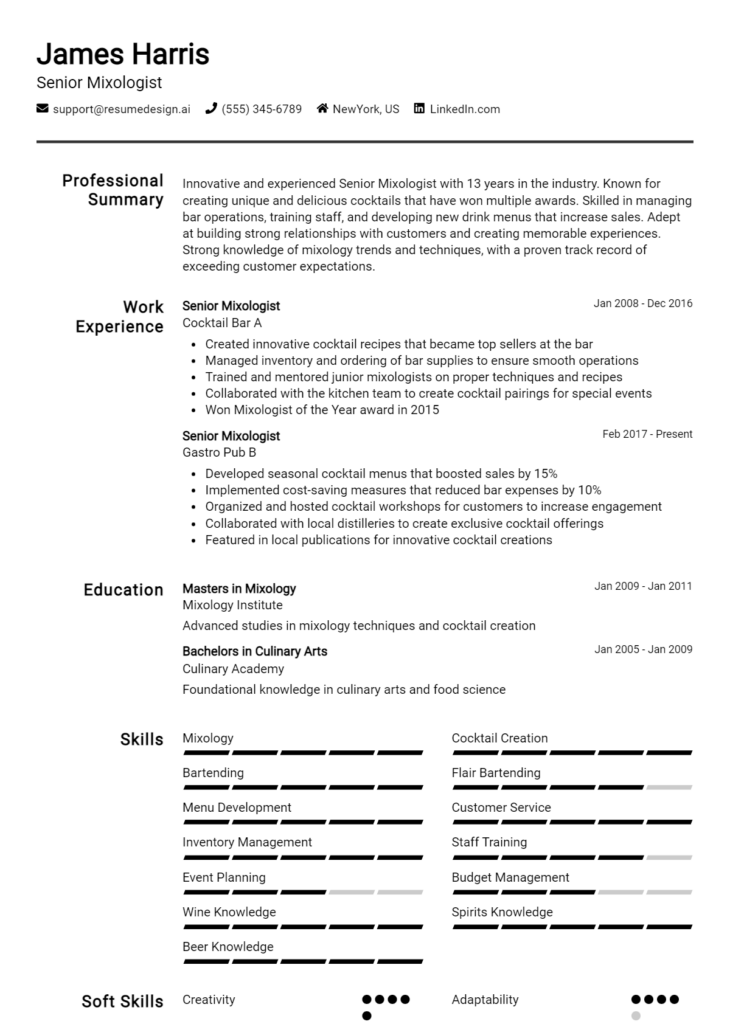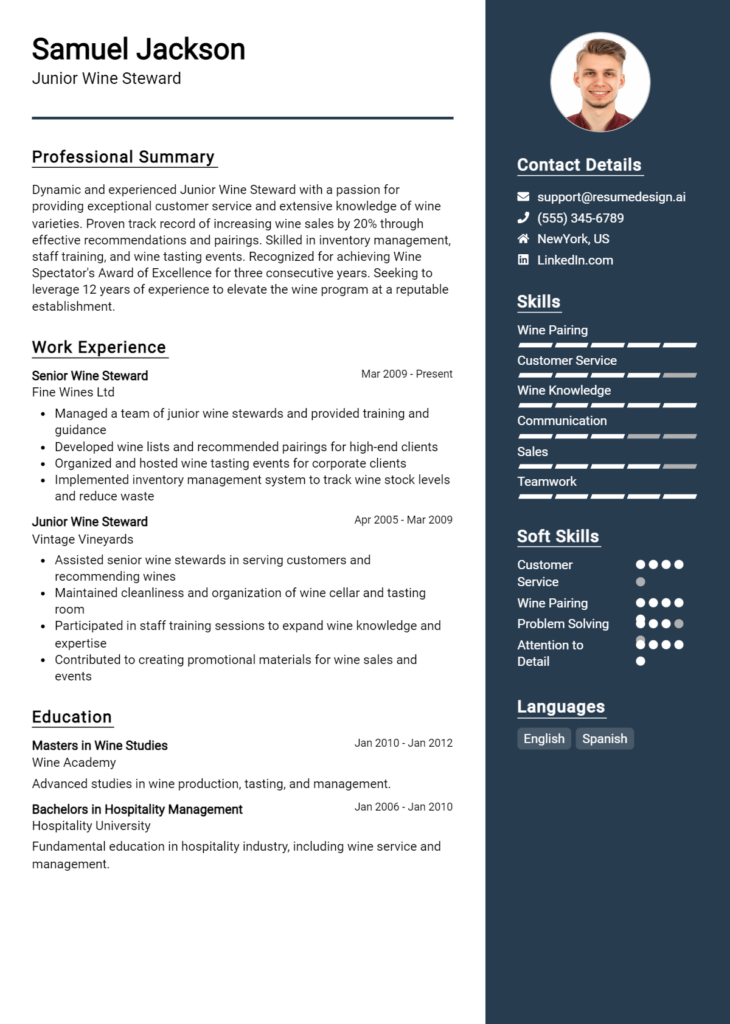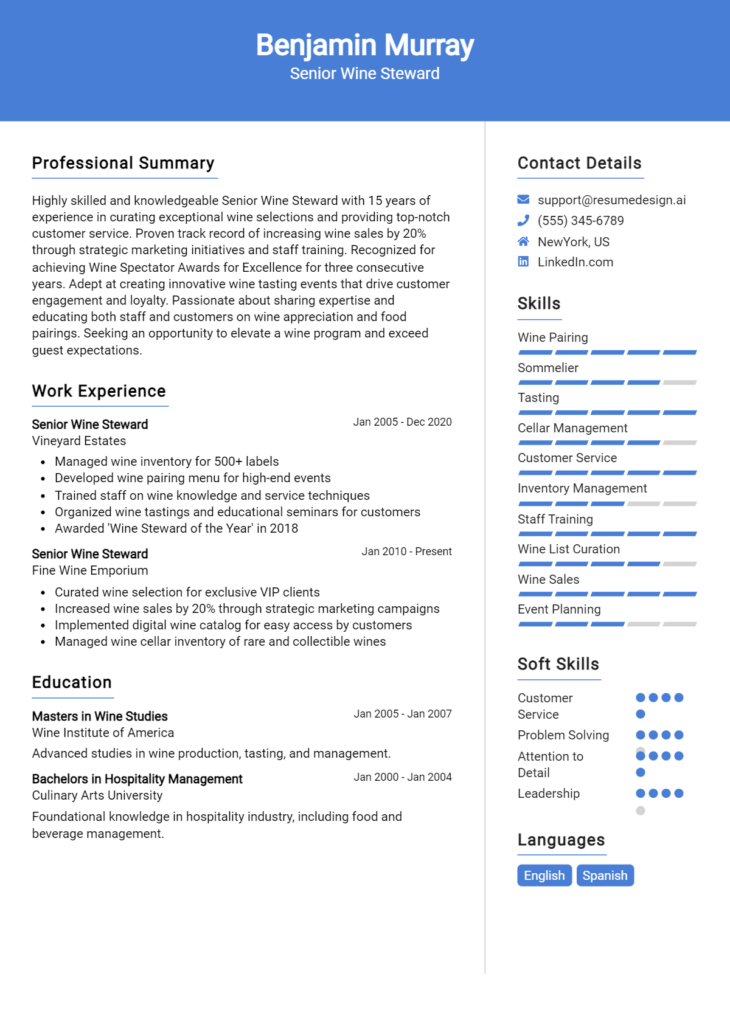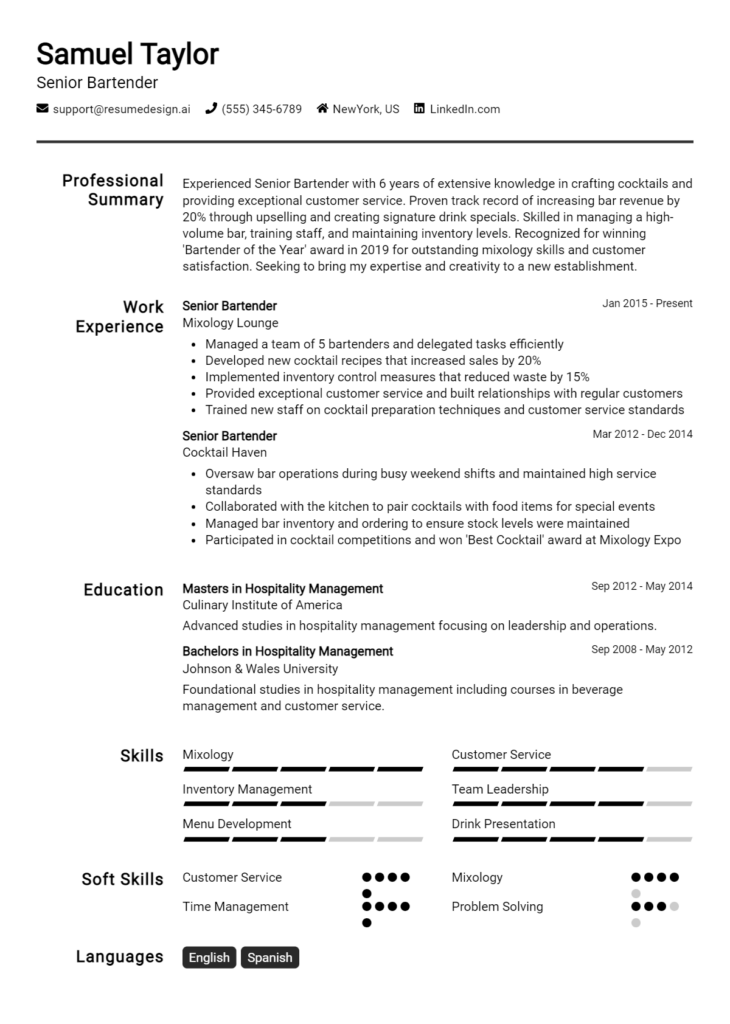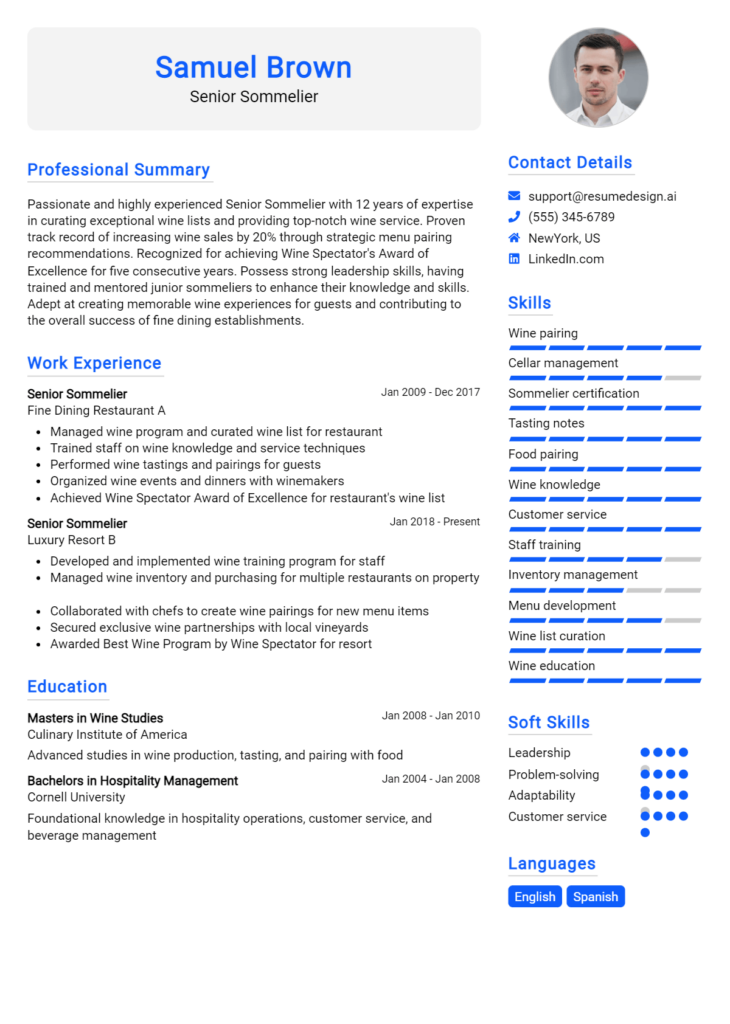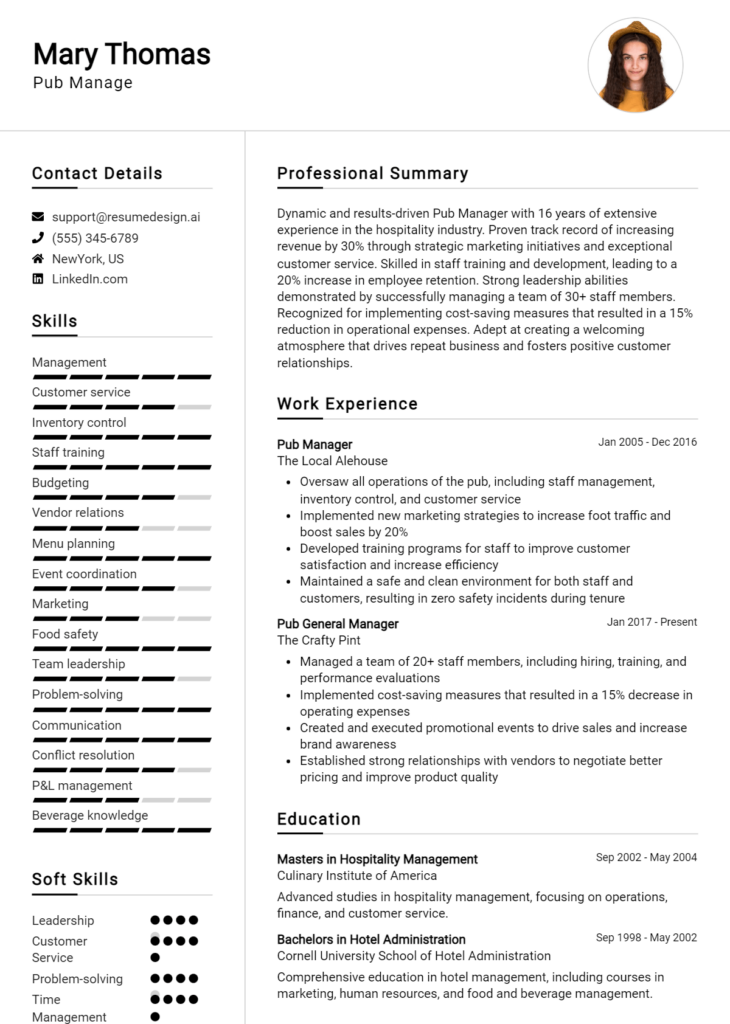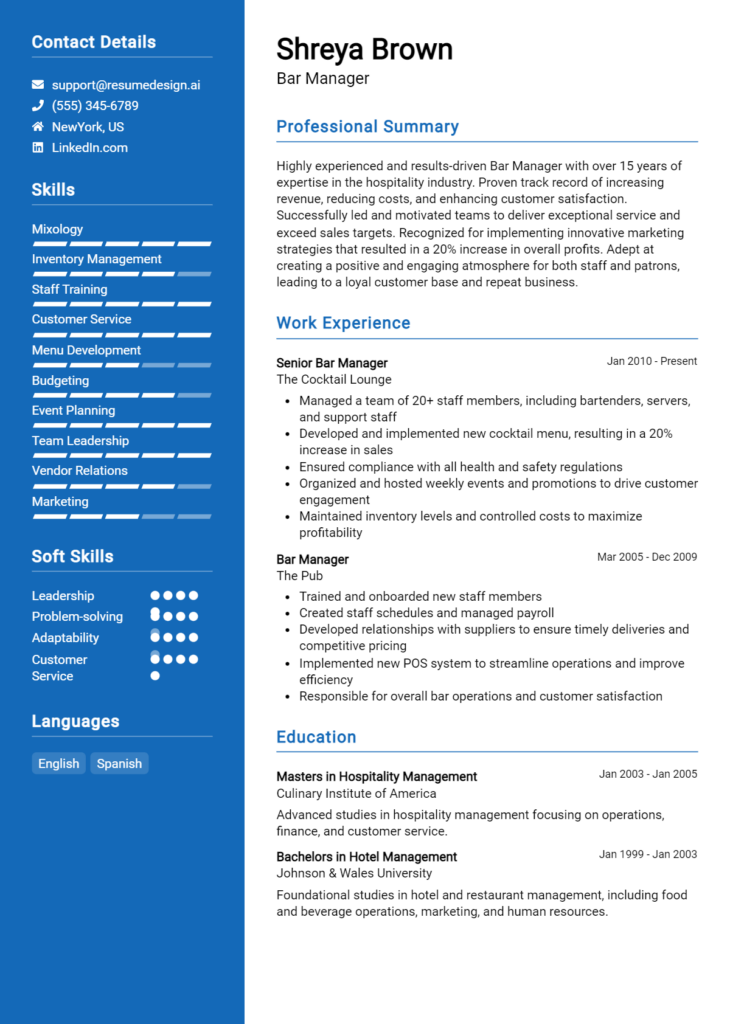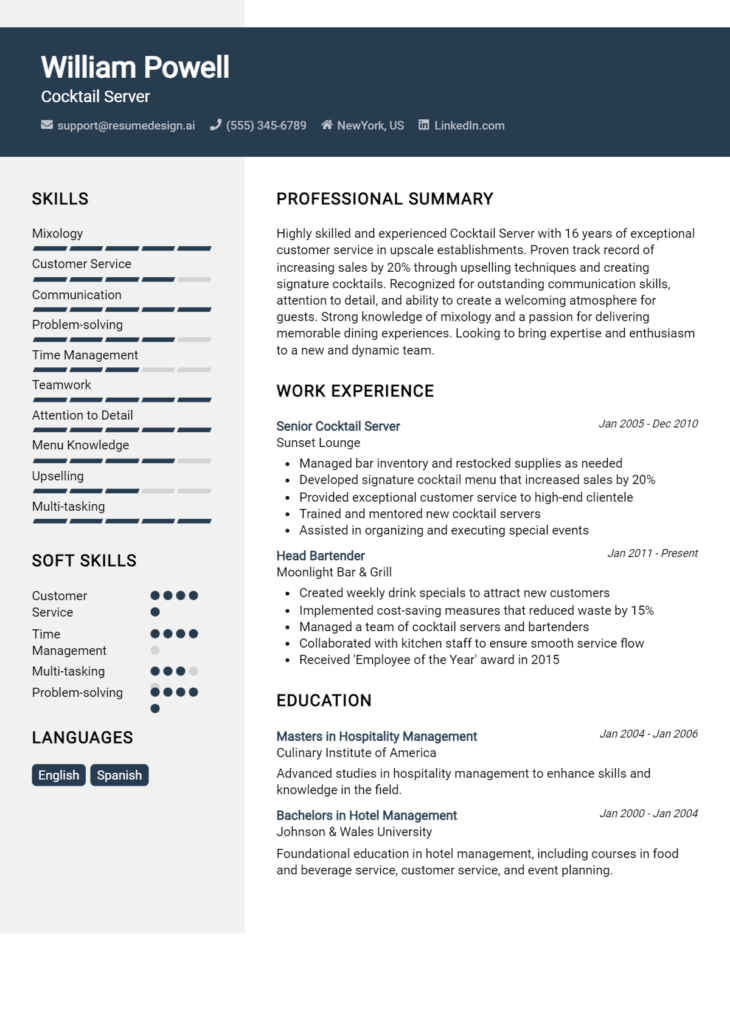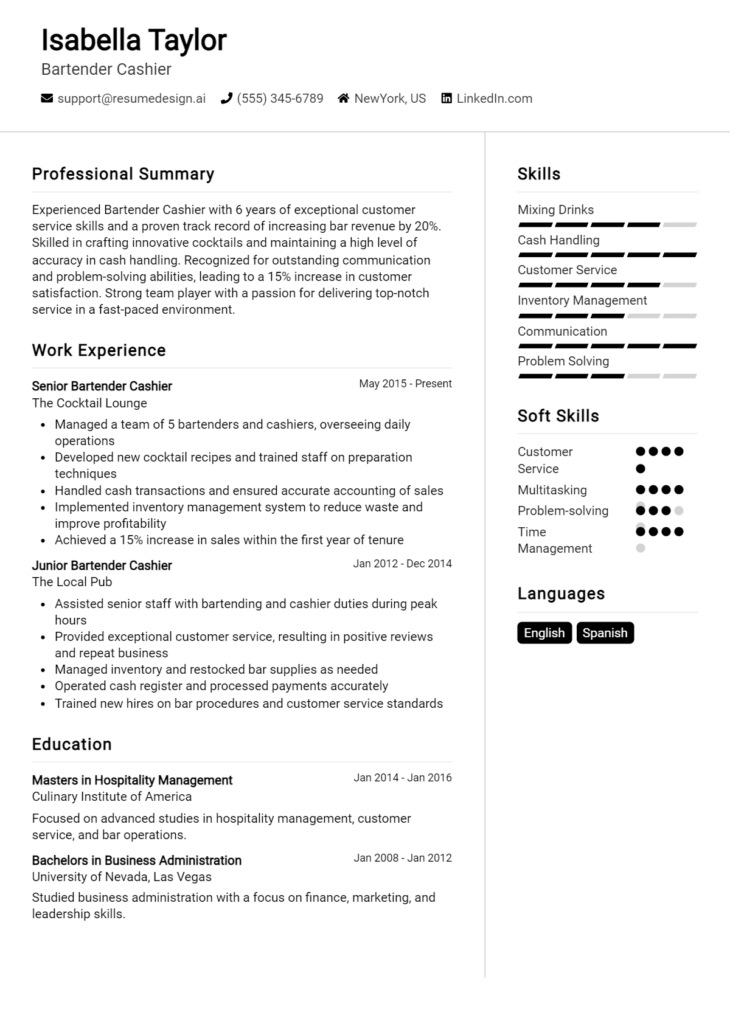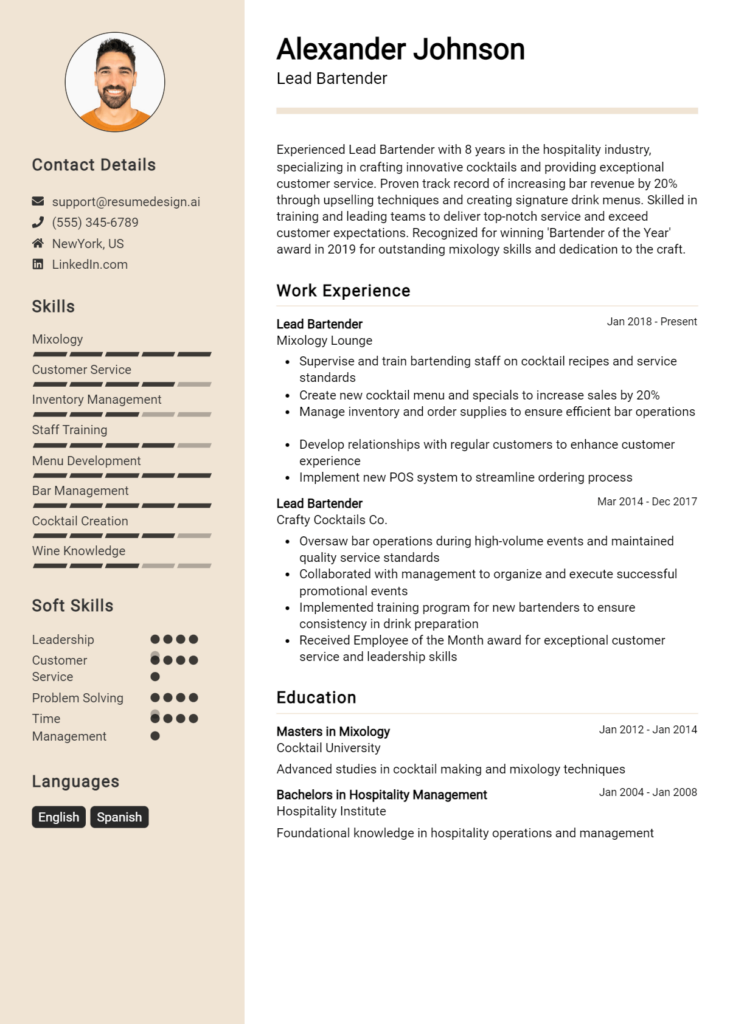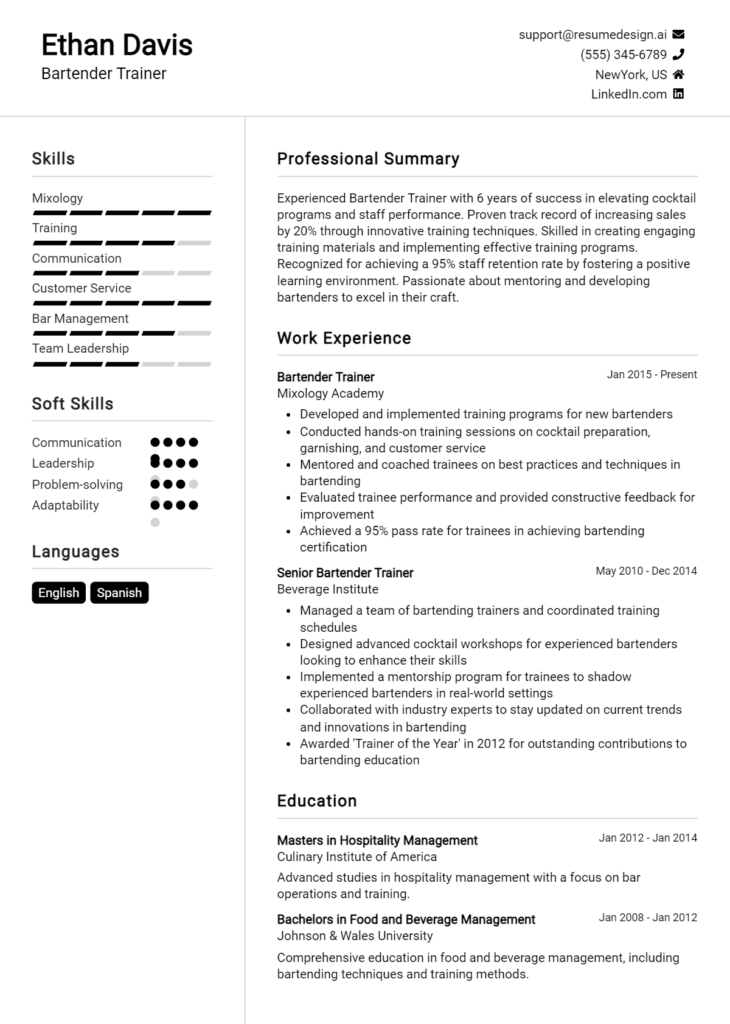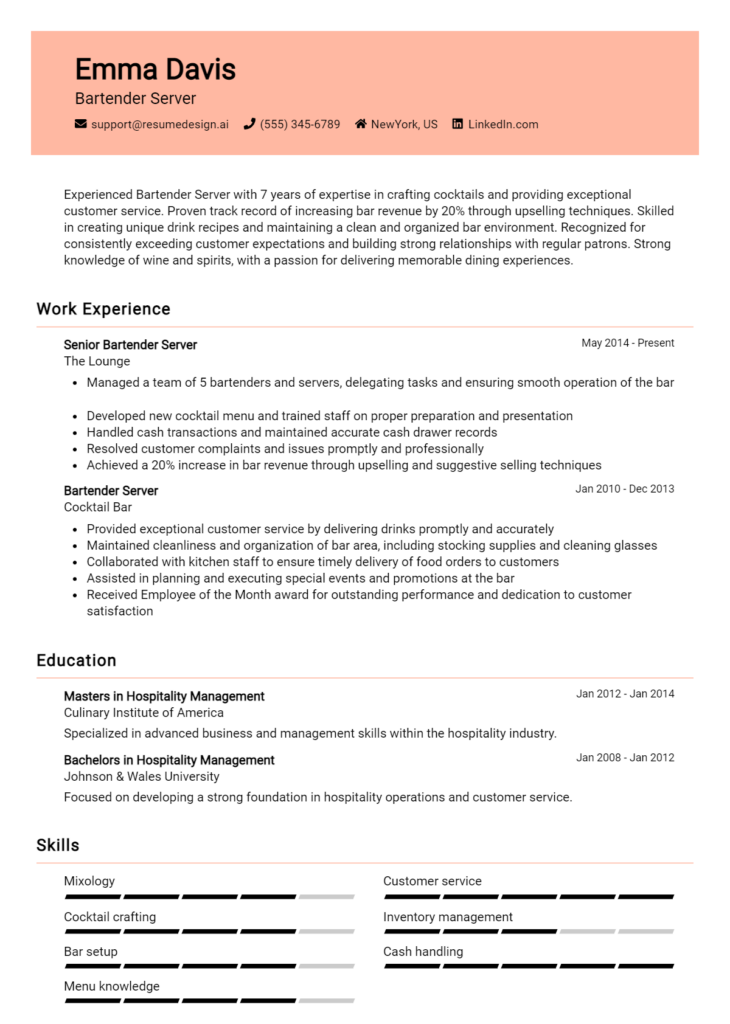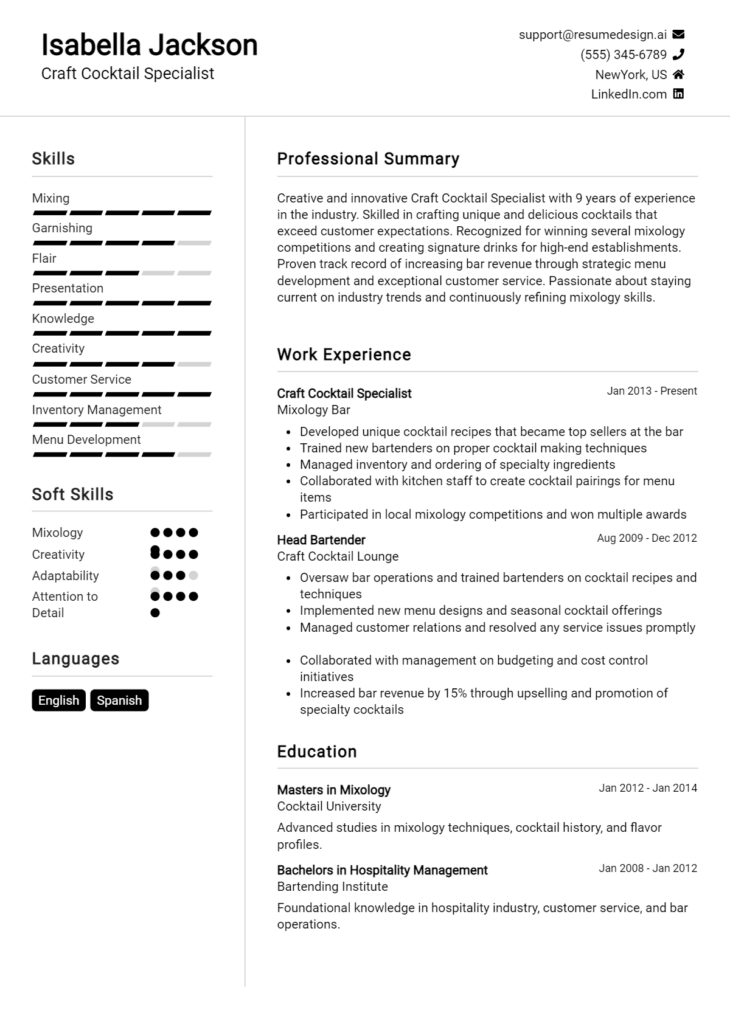Head Bartender Core Responsibilities
The Head Bartender plays a pivotal role in the hospitality industry, seamlessly bridging the gap between front-of-house and back-of-house operations. Key responsibilities include managing bar staff, crafting innovative cocktails, and ensuring customer satisfaction. Essential skills encompass technical knowledge of mixology, operational oversight, and strong problem-solving abilities to address challenges swiftly. These competencies not only enhance service quality but also significantly contribute to the organization's overall goals. A well-structured resume can effectively highlight these qualifications, showcasing a candidate's potential for success.
Common Responsibilities Listed on Head Bartender Resume
- Supervise and train bartending staff to ensure high-quality service.
- Create and update cocktail menus with innovative drink options.
- Manage inventory and order supplies to maintain optimal stock levels.
- Ensure compliance with health and safety regulations.
- Provide exceptional customer service and resolve any complaints.
- Monitor bar operations and make adjustments for efficiency.
- Develop and implement promotional strategies to increase sales.
- Collaborate with management to enhance overall bar performance.
- Maintain cleanliness and organization of the bar area.
- Track and analyze sales data to inform business decisions.
- Conduct regular staff meetings to discuss performance and goals.
- Establish and enforce standard operating procedures for bartending staff.
High-Level Resume Tips for Head Bartender Professionals
A well-crafted resume is essential for Head Bartender professionals aiming to stand out in a competitive job market. As the first impression a candidate makes on a potential employer, the resume must effectively showcase not only the applicant's skills and experience but also their unique achievements in the industry. A strong resume serves as a powerful marketing tool that communicates the candidate's value proposition, setting the stage for future interviews. This guide will provide practical and actionable resume tips specifically tailored for Head Bartender professionals to help them create an impactful presentation of their qualifications.
Top Resume Tips for Head Bartender Professionals
- Tailor your resume to each job description by incorporating relevant keywords and phrases that align with the specific role you are applying for.
- Highlight your relevant experience by focusing on positions that demonstrate your bartending skills, leadership abilities, and customer service excellence.
- Quantify your achievements whenever possible, using numbers to illustrate your impact, such as revenue generated, customer satisfaction ratings, or successful events managed.
- Showcase industry-specific skills such as mixology expertise, knowledge of wine and spirits, and proficiency with bar equipment and technology.
- Include certifications and training related to bartending, such as bartending school credentials, TIPS certification, or mixology workshops.
- Utilize a clean and professional format that enhances readability, making it easy for hiring managers to quickly identify key information.
- Incorporate a summary statement at the top of your resume that encapsulates your experience, skills, and career objectives in a concise manner.
- Demonstrate your ability to work under pressure by mentioning experiences where you successfully managed high-volume situations or resolved customer complaints.
- Emphasize teamwork and collaboration by detailing experiences where you've worked effectively with kitchen staff, servers, or management to enhance customer experiences.
By implementing these tips, Head Bartender professionals can significantly increase their chances of landing a job in this exciting field. A thoughtfully crafted resume that highlights relevant skills, achievements, and experiences will not only capture the attention of hiring managers but also demonstrate a candidate's commitment to excellence in bartending.
Why Resume Headlines & Titles are Important for Head Bartender
In the competitive world of bartending, especially at the head bartender level, a well-crafted resume headline or title is crucial for making a lasting impression. A strong headline can serve as an immediate hook, capturing the attention of hiring managers and succinctly summarizing a candidate's key qualifications in a single impactful phrase. This concise statement should be relevant and directly aligned with the role being applied for, helping to distinguish the candidate from others and showcasing their unique skills and experiences that make them the ideal fit for the position.
Best Practices for Crafting Resume Headlines for Head Bartender
- Keep it concise: Aim for a headline that conveys your message in just a few words.
- Be role-specific: Include relevant job titles or keywords that reflect the head bartender position.
- Highlight key skills: Mention specific skills or areas of expertise that set you apart.
- Showcase experience: Incorporate your years of experience or notable accomplishments.
- Use action-oriented language: Start with strong verbs to convey confidence and dynamism.
- Tailor to the job description: Customize your headline to align with the requirements of the job posting.
- Avoid jargon: Use clear language that can be understood by anyone, including non-industry professionals.
- Make it impactful: Aim for a headline that resonates and leaves a memorable impression.
Example Resume Headlines for Head Bartender
Strong Resume Headlines
"Innovative Head Bartender with 10+ Years of Craft Cocktail Experience"
“Award-Winning Mixologist Specializing in Seasonal Ingredients and Unique Flavor Profiles”
“Dynamic Head Bartender and Team Leader with Proven Track Record in High-Volume Venues”
“Creative Bartending Expert Focused on Exceptional Customer Experiences and Craft Beverage Development”
Weak Resume Headlines
“Bartender Looking for a Job”
“Head Bartender with Some Experience”
Strong headlines are effective because they immediately communicate the candidate's unique qualifications and areas of expertise, which can entice hiring managers to delve deeper into the resume. They provide a snapshot of what the candidate offers, showcasing confidence and relevance. In contrast, weak headlines fail to impress as they lack specificity and clarity, making it difficult for hiring managers to gauge the candidate's potential or suitability for the role. Without a compelling headline, a resume may go unnoticed in a sea of applicants, underscoring the importance of crafting a strong and memorable statement at the very top.
Writing an Exceptional Head Bartender Resume Summary
A well-crafted resume summary is crucial for a Head Bartender as it serves as the first impression to hiring managers. This brief overview quickly captures attention by showcasing key skills, relevant experience, and notable accomplishments that align with the specific demands of the role. A strong summary should be concise yet impactful, effectively highlighting qualifications that set the candidate apart from the competition. By tailoring the summary to the job description, applicants can demonstrate their suitability and enthusiasm for the position, increasing their chances of securing an interview.
Best Practices for Writing a Head Bartender Resume Summary
- Quantify achievements to demonstrate impact, such as sales growth or customer satisfaction scores.
- Focus on key skills relevant to the bartending role, such as mixology expertise, customer service, and inventory management.
- Tailor the summary to directly reflect the qualifications outlined in the job description.
- Keep it concise, ideally between 2-4 sentences, to maintain the reader's attention.
- Include any relevant certifications or training that enhance your qualifications.
- Highlight leadership or team management experience, especially if applying for a senior role.
- Use strong action verbs to convey your contributions and experiences more dynamically.
- Avoid jargon and overly complex language; aim for clarity and professionalism.
Example Head Bartender Resume Summaries
Strong Resume Summaries
Dynamic Head Bartender with over 8 years of experience in high-volume establishments, recognized for increasing cocktail sales by 25% through innovative menu design and exceptional customer engagement.
Detail-oriented professional skilled in mixology and customer relations, with a proven track record of maintaining a 95% customer satisfaction rating and leading a team of 6 bartenders to achieve record-breaking sales during peak seasons.
Experienced Head Bartender and team leader, adept at training staff in mixology techniques and efficient bar operations. Successfully reduced inventory costs by 15% while increasing overall beverage sales by 30% over two years.
Weak Resume Summaries
I am a bartender with several years of experience looking for a new opportunity in a bar.
Dedicated and experienced bartender seeking a position where I can use my skills and knowledge.
The strong resume summaries are considered effective because they provide concrete examples of achievements, quantifiable results, and specific skills that align with the Head Bartender role. They demonstrate the candidate's direct impact on previous establishments, making them compelling to hiring managers. In contrast, the weak summaries are vague and do not offer any measurable outcomes or detailed insights into the candidate's capabilities, which fails to attract attention or convey a strong sense of qualification.
Work Experience Section for Head Bartender Resume
The work experience section of a Head Bartender resume is vital as it serves as a testament to the candidate's technical skills, team management capabilities, and ability to deliver high-quality products in a fast-paced environment. This section allows potential employers to assess how past experiences align with industry standards and expectations. By quantifying achievements—such as revenue generated or improvements in customer satisfaction—candidates can effectively demonstrate their impact in previous roles. Aligning experience with the demands of the industry is crucial to stand out in a competitive job market.
Best Practices for Head Bartender Work Experience
- Highlight specific technical skills such as mixology, beverage knowledge, and equipment operation.
- Quantify achievements, such as sales increases or customer satisfaction scores.
- Showcase leadership experience, including managing bar staff and training new hires.
- Emphasize collaboration with kitchen staff, management, and event coordinators.
- Detail any relevant certifications or training that enhance credibility.
- Use action verbs to describe responsibilities and accomplishments clearly.
- Tailor the work experience to reflect the specific requirements of the job you are applying for.
- Include any awards or recognitions received in previous roles to highlight excellence.
Example Work Experiences for Head Bartender
Strong Experiences
- Managed a team of 10 bartenders, increasing overall bar revenue by 25% within one year through innovative cocktail menus and upselling techniques.
- Implemented a new inventory management system that reduced waste by 15%, resulting in a cost savings of $5,000 annually.
- Developed and led a training program for new staff, improving service speed by 30% and enhancing customer satisfaction ratings to 95%.
- Collaborated with event planners to create signature cocktails for over 50 special events, enhancing guest experiences and driving repeat business.
Weak Experiences
- Worked at a bar where I made drinks.
- Helped out with some inventory tasks occasionally.
- Assisted in training new staff when needed.
- Participated in events every now and then.
The examples listed as strong experiences provide clear, quantifiable outcomes and demonstrate effective technical leadership and collaboration, making them compelling to potential employers. In contrast, the weak experiences lack specificity and measurable achievements, failing to convey the candidate's impact or skill set, which diminishes their appeal in a competitive job market.
Certifications and Education for a Head Bartender Resume
When crafting a resume for a Head Bartender position, it's essential to highlight relevant certifications and educational experiences that showcase your expertise and commitment to the craft of bartending. Here are some guidelines to consider:
Certifications:
Bartending Certification: This foundational certification covers essential skills such as mixing drinks, customer service, and bar management. Look for programs that are recognized in your area or by leading bartending schools.
Responsible Beverage Service (RBS) Certification: Many states require bartenders to complete RBS training to ensure they serve alcohol responsibly. This certification demonstrates your understanding of alcohol laws, age verification, and how to handle intoxicated patrons.
Mixology Certification: Pursuing advanced mixology courses can set you apart from other candidates. These programs often cover techniques for crafting cocktails, using unique ingredients, and understanding flavor profiles.
TIPS Certification: Training for Intervention Procedures (TIPS) is a widely recognized certification that focuses on responsible alcohol service and intervention strategies to prevent over-serving and underage drinking.
Educational Backgrounds:
Culinary Arts Degree: A degree in culinary arts can provide a strong foundation in food and beverage service, enhancing your understanding of flavor combinations and the culinary aspects of bartending.
Hospitality Management Degree: This degree focuses on the broader aspects of hospitality, including customer service, business management, and event planning, all of which are valuable in a bartending leadership role.
Mixology or Bartending School: Attending a specialized bartending school can provide practical skills and knowledge tailored specifically to bartending, often including hands-on experience and networking opportunities.
High School Diploma or GED: While not always required, having a high school diploma or GED is essential and serves as a baseline for further education and certifications in the hospitality industry.
By prioritizing these certifications and educational experiences on your resume, you can effectively demonstrate your qualifications and readiness for the Head Bartender role.
Top Skills & Keywords for Head Bartender Resume
As a Head Bartender, showcasing the right skills on your resume is crucial for standing out in a competitive job market. Employers look for candidates who not only have a strong foundation in bartending techniques but also possess the interpersonal abilities necessary to create a welcoming atmosphere for patrons. A well-rounded skill set demonstrates your capacity to manage a bar efficiently, lead a team, and provide exceptional customer service. By highlighting both hard and soft skills, you can illustrate your expertise and readiness for the responsibilities that come with this dynamic role.
Top Hard & Soft Skills for Head Bartender
Hard Skills
- Mixology Techniques
- Cocktail Creation
- Beverage Knowledge
- Inventory Management
- POS System Proficiency
- Drink Menu Development
- Bar Equipment Maintenance
- Cost Control and Pricing Strategies
- Knowledge of Alcohol Laws and Regulations
- Wine and Beer Pairing
- Health and Safety Compliance
- Customer Relationship Management (CRM) Software
- Bartending Certifications
- Cash Handling Procedures
- Event Planning and Coordination
Soft Skills
- Leadership and Team Management
- Excellent Communication Skills
- Problem-Solving Abilities
- Customer Service Orientation
- Time Management
- Creativity and Innovation
- Conflict Resolution
- Adaptability and Flexibility
- Attention to Detail
- Stress Management
- Multitasking
- Positive Attitude
- Empathy
- Active Listening
- Cultural Awareness
By integrating these essential skills with your work experience, you'll create a compelling resume that effectively showcases your qualifications for the Head Bartender position.
Stand Out with a Winning Head Bartender Cover Letter
Dear [Hiring Manager's Name],
I am excited to apply for the Head Bartender position at [Establishment Name], as advertised on [where you found the job listing]. With over [X years] of experience in mixology and a passion for delivering exceptional customer service, I am confident that my skills and expertise align perfectly with the requirements of this role. I have honed my craft in various fast-paced environments, where I successfully managed bar operations, trained staff, and created innovative cocktail menus that delighted patrons.
At my previous position with [Previous Establishment Name], I led a team of bartenders to elevate our cocktail offerings, which resulted in a [X]% increase in sales over the course of a year. I take pride in my ability to not only create delicious drinks but also to foster a welcoming atmosphere for guests. My experience includes managing inventory, optimizing bar efficiency, and ensuring compliance with health and safety regulations. I believe that a well-organized bar is the backbone of an extraordinary guest experience, and I am committed to maintaining high standards in every aspect of bar management.
Furthermore, I am adept at building strong relationships with both customers and team members. I understand that a great bar is not just about the drinks but also about the stories shared and the connections made. I am excited about the opportunity to bring my creativity, leadership, and enthusiasm for mixology to [Establishment Name], and I am eager to contribute to your team’s success. Thank you for considering my application. I look forward to the opportunity to discuss how my background and vision align with the goals of your establishment.
Warm regards,
[Your Name]
[Your Contact Information]
[Your LinkedIn Profile or Professional Website, if applicable]
Common Mistakes to Avoid in a Head Bartender Resume
When crafting a resume for the role of Head Bartender, it's crucial to present your skills and experience in a way that captures the attention of employers. However, many candidates make common mistakes that can detract from their qualifications. Avoiding these pitfalls can significantly enhance your chances of landing an interview. Here are some frequent errors to steer clear of when creating your Head Bartender resume:
Vague Job Descriptions: Failing to provide specific details about past roles can leave employers unclear about your actual responsibilities and achievements. Instead, use quantifiable metrics to highlight your contributions.
Overlooking Key Skills: Not mentioning essential bartending skills, such as mixology techniques, cocktail presentation, or customer service excellence, can make your resume less compelling. Tailor your skills section to match the job description.
Ignoring Format and Layout: A cluttered or overly complex resume can be difficult to read. Stick to a clean, professional format that makes it easy for hiring managers to find the information they need.
Inconsistent Employment Dates: Leaving gaps or inconsistencies in your employment history can raise red flags. Ensure your dates are accurate and presented in a clear format to maintain credibility.
Lack of Personal Branding: Failing to showcase your unique style or personality can make your resume blend in with others. Incorporate a personal statement or summary that reflects your passion for bartending and your approach to customer service.
Neglecting Achievements: Simply listing job duties without highlighting your achievements can make your experience seem less impactful. Include specific examples of how you improved operations or enhanced customer satisfaction.
Using Clichés: Phrases like "hardworking" or "team player" are overused and don’t add value. Instead, provide concrete examples of your contributions that demonstrate these traits.
Failing to Proofread: Typos and grammatical errors can undermine your professionalism. Always proofread your resume multiple times or have someone else review it to catch any mistakes before submission.
Conclusion
As a Head Bartender, your role encompasses a range of responsibilities, from managing bar operations to creating innovative drink menus and ensuring exceptional customer service. Key skills include mixology expertise, leadership, inventory management, and the ability to work under pressure. Your experience should highlight not only your bartending skills but also your capacity to train staff, handle customer complaints, and maintain a clean and organized workspace.
In summary, to stand out as a Head Bartender, it’s essential to showcase your unique skills and experiences effectively. Don't underestimate the importance of a well-crafted resume that reflects your strengths and achievements in the bartending field.
Ready to elevate your job search? Take the first step by reviewing your Head Bartender resume. Utilize resources such as resume templates, a convenient resume builder, and cover letter templates to create a document that highlights your qualifications and sets you apart from the competition. Start crafting your perfect resume today!

